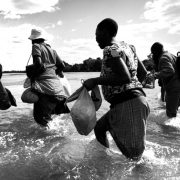|
Getting your Trinity Audio player ready...
|
On Monday 18 February 2019 Corruption Watch made submissions on the 2019 white paper on Home Affairs, after the Department of Home Affairs (DHA) put out the call for comments towards the end of January. The deadline was 18 February.
The white paper is part of the DHA’s repositioning programme that, it says, will align with its modernisation programme and other transformation initiatives. A discussion paper on repositioning the DHA was released for public comment in May 2017, and from the input to this document the white paper was drafted – one that will “define the mandate, role, status and obligations a Home Affairs of the future”.
The paper sets out, for the first time, the DHA’s exclusive mandate and its central role in the state and society. That mandate is three-fold:
- Manage the official identity and status of persons
- Manage international migration
- Manage asylum seekers and refugees.
Citizens and other clients need to be served by professional officials who have modern, digital systems, says the DHA. But the department has inherited an operating and organisational model with outdated systems that has “increasingly frustrated its efforts to build a modern, secure department”.
Furthermore, the department bemoans the fact that over half its officials do not have a higher education qualification, which makes it harder to assist people efficiently. But this will change, as systems will be automated and accessible through many channels, while officials will be retrained to investigate and resolve the most complex cases, manage risks, and protect the systems from cyber-crime. The same basic model will be adapted to manage international migration.
After all comments have been considered, the department will draft a final version of the white paper and submit it to Cabinet.
“We view our submissions on the white paper on Home Affairs as an opportunity to highlight the deficiencies and culture of corruption involved in the refugee and asylum seeker system, which continue to remain unaddressed,” says Corruption Watch’s legal head, Deborah Mutemwa-Tumbo, adding that the organisation’s previous work with refugees and asylum seekers on the Project Lokisa campaign has illuminated the plight of these vulnerable people and the corrupt practices that exploit them.
“We have previously made submissions on the Refugee Act and the Immigration Amendment Bill with the intention to highlight and suggest remedies to the vulnerabilities in the applicable legislation, which enables concerning levels of maladministration and corruption to take place at the Department of Home Affairs,” says Mutemwa-Tumbo.
CW has also conducted extensive research and held many engagements around corruption in the DHA in relation to asylum and refugee applications. Our project, called Project Lokisa or “Let’s fix it” was launched on 1 June 2015 and with other NGOs, we gathered reports of corruption in the Gauteng area. The final report is available on our website. It features the outcomes of our investigations, data and statistics relating to corruption affecting refugees and asylum seekers, interviews with our whistle-blowers and recommendations on how to address corruption in this space.
Tackling long-standing challenges
The white paper proposes sustainable solutions to the DHA’s long-standing challenges, including long queues at its centres, infrastructure problems, staff shortages, office space, connectivity and networks, and changes to immigration policy. It also proposes the establishment of a secure national identity system (NIS) to replace the national population registry. The NIS will be the core of the new-look DHA. It will be “the backbone of an integrated digital South Africa”, says the DHA, and is aligned to mandate one above. In terms of processing personal information, the NIS will adhere strictly to the Popi Act and individuals’ data will be protected.
“It will thus be a powerful enabler of inclusive economic development and will drastically reduce fraud and other related crimes,” says home affairs minister Siyabonga Cwele.
Corruption Watch’s experience with fraud and corruption in the DHA paints a disturbing picture. “As an organisation, we have received more than 300 reports or corruption since 2015 in this area, which continue to illustrate high levels of impropriety at refugee reception offices by Home Affairs officials, security guards, administrators and even interpreters,” Mutemwa-Tumbo says. A large majority of the reports involve the solicitation of bribes in return for issuing asylum and refugee permits. “The number of reports citing corruption at the refugee offices continue to rise now on a daily basis.”
In light of this, Mutemwa-Tumbo adds, it is pertinent that the organisation continues to engage with legislative and policy changes in this area to emphasise the legislative gaps and to offer practical and progressive solutions to the gross levels of corruption taking place. “The severe interference with refugee management and the application process has far reaching consequences for asylum seekers and, importantly, continues to undermine the regional and international obligations that South Africa is bound to.”
Corruption Watch’s submissions focus on the mechanisms that deal with the management of asylum seekers and refugees – mechanisms which do not take into account the fundamental deficiencies in the refugee application processes and regulations that give rise to systematic grand corruption.
Against this backdrop of corruption, we submitted that issues of good governance within the white paper and the empowering legal framework (specifically the Refugee Act, 130 of 1998 and the Immigration Amendment Bill) be more carefully considered through the lens of these findings and recommendations.
We submitted that the legal framework has been grossly abused and at times deviated from by DHA officials, leading to a systematic form of human rights violations that has compromised South Africa’s obligation to the international human rights standard of non-refoulement – not forcing refugees or asylum seekers to return to a country where they are likely to be persecuted.
The vulnerabilities identified in the empowering legal framework must be addressed. Significant change is necessary in institutional behaviours and practices, as well as the introduction of ethical and integrity tests and mechanisms within the DHA, which will ensure transparency and end impunity.






